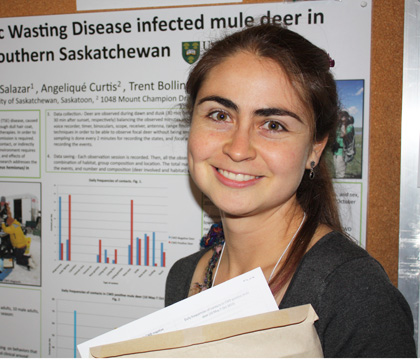WCVM graduate student Dr. Maria Fernanda Mejia-Salazar, originally from Mexico City, received the 42-month scholarship through CONACyT (Consejo Nacional de Ciencia y Tecnología). CONACyT is Mexico's most prestigious postgraduate studies scholarship program.
The US$20,000-per-year award will support Mejia-Salazar's research into the disease dynamics of CWD in southern Saskatchewan deer.
CWD is a contagious, fatal prion disease that is becoming increasingly prevalent in mule deer and white-tailed deer herds in North America.
Mejia-Salazar is part of a University of Saskatchewan research team that includes her graduate supervisor Dr. Trent Bollinger as well as Drs. Cheryl Waldner and Joe Stookey — all based in the WCVM. Another member, Dr. Yeen Ten Hwang, is an adjunct professor at the WCVM and a provincial wildlife health specialist with the Saskatchewan Ministry of Environment.
The team's work is supported by PrioNet Canada, the Government of Saskatchewan and the Canadian Cooperative Wildlife Health Centre.
"I wouldn't have pursued the PhD program and consequently received the CONACyT scholarship if it weren't for Dr. Bollinger and the extraordinary working team at the lab," explains Mejia-Salazar, who started her MSc research at the WCVM in 2009 and transferred to the PhD program in June 2011.
"Receiving a CONACyT scholarship from my country isn't an easy task, so it not only fills me with pride, it also recognizes the great quality of the U of S."
Mejia-Salazar is exploring the factors that affect mule deer sociality, movement patterns and use of environmental sites. By integrating these data and disease dynamics, she and her fellow researchers will gain a greater understanding of prion transmission and prevalence trends in a CWD-endemic area.
The researchers' long-term goal is to develop better management strategies for controlling the disease in populations of wild deer.
Besides her scholarship, Mejia-Salazar has earned other honours through her CWD research. Last year she received a $1,000 travel award from PrioNet Canada. With this award, Mejia-Salazar gave a presentation at the 60th annual Wildlife Disease Association meeting held in Québec City, Que., in August 2011.
Mejia-Salazar also received PrioNet Canada's Write Now! Award for her popular article, "Paparazzi-ing mule deer . . . looking behind the camera to untangle CWD transmission," which was published in a recent edition of PrioNews, news publication for PrioNet Canada.
That eye-catching title refers to one aspect of Mejia-Salazar's comprehensive investigation – the analysis of around 20,000 pictures taken with triggered-by-movement cameras at the different sites visited by mule deer as well as other species that visit and scavenge CWD-positive mule deer carcasses.
The US$20,000-per-year award will support Mejia-Salazar's research into the disease dynamics of CWD in southern Saskatchewan deer.
CWD is a contagious, fatal prion disease that is becoming increasingly prevalent in mule deer and white-tailed deer herds in North America.
Mejia-Salazar is part of a University of Saskatchewan research team that includes her graduate supervisor Dr. Trent Bollinger as well as Drs. Cheryl Waldner and Joe Stookey — all based in the WCVM. Another member, Dr. Yeen Ten Hwang, is an adjunct professor at the WCVM and a provincial wildlife health specialist with the Saskatchewan Ministry of Environment.
The team's work is supported by PrioNet Canada, the Government of Saskatchewan and the Canadian Cooperative Wildlife Health Centre.
"I wouldn't have pursued the PhD program and consequently received the CONACyT scholarship if it weren't for Dr. Bollinger and the extraordinary working team at the lab," explains Mejia-Salazar, who started her MSc research at the WCVM in 2009 and transferred to the PhD program in June 2011.
"Receiving a CONACyT scholarship from my country isn't an easy task, so it not only fills me with pride, it also recognizes the great quality of the U of S."
Mejia-Salazar is exploring the factors that affect mule deer sociality, movement patterns and use of environmental sites. By integrating these data and disease dynamics, she and her fellow researchers will gain a greater understanding of prion transmission and prevalence trends in a CWD-endemic area.
The researchers' long-term goal is to develop better management strategies for controlling the disease in populations of wild deer.
Besides her scholarship, Mejia-Salazar has earned other honours through her CWD research. Last year she received a $1,000 travel award from PrioNet Canada. With this award, Mejia-Salazar gave a presentation at the 60th annual Wildlife Disease Association meeting held in Québec City, Que., in August 2011.
Mejia-Salazar also received PrioNet Canada's Write Now! Award for her popular article, "Paparazzi-ing mule deer . . . looking behind the camera to untangle CWD transmission," which was published in a recent edition of PrioNews, news publication for PrioNet Canada.
That eye-catching title refers to one aspect of Mejia-Salazar's comprehensive investigation – the analysis of around 20,000 pictures taken with triggered-by-movement cameras at the different sites visited by mule deer as well as other species that visit and scavenge CWD-positive mule deer carcasses.
Share this story
